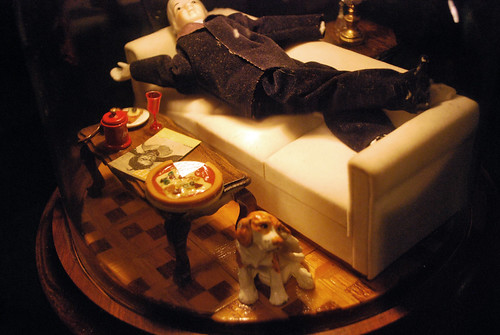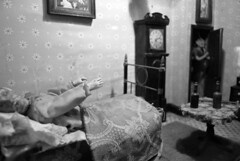1 Patrick Leigh Fermor's mother's name was Aeileen, but as a girl "she signed herself 'Avrille' or 'Mixed Pickles' when writing to her parents, while they and her husband most often referred to her as Muriel." Patrick's father, named Lewis, she called Peter. Patrick, meanwhile, was known to all as Paddy, which is much more straightforward.
2 You get the impression that no school could have held Paddy--his person or his attention--but he does seem to have been subjected to a couple that were exemplars of English strangeness and decrepitude. His first, Walsham Hall, was run by Major Faithfull, "a pioneer of the wilder shores of education, . . . with messianic eyes and a shock of grey hair." Cooper describes the curriculum:
Lessons were very haphazard; there was also what Paddy described as "a lot of lying down and doing free association while Major Faithfull took notes. I used to invent all sorts of things for him." Most bewildering of all were the country dancing and eurhythmics, in which both staff and pupils participated in the nude. "Nimbly and gravely, keeping time to a cottage piano and a recorder, we sped through the figures of Gathering Peascods, Sellinger's Round, Picking-up Sticks and Old Mole."It reminds me of the school in which another young Patrick was once placed, by his Auntie Mame:
"So like your father," she sighed. "By the way, I know the most divine new school that a friend of mine is starting. Coeducational and completely revolutionary. All classes are held in the nude under ultraviolet ray. Not a repression left after the first session."3 His next stop was King's School, Canterbury, which was founded by Henry VIII and boasted Christopher Marlowe among its graduates. By Fermor's time, it was utterly run down, but it's not clear that even the most up-to-date and resource-rich of schools could have handled the young Fermor. His fellow student Canon Hill
remembered that Paddy's arrival had had an immediate impact on the school. He spoke in elaborate sentences, a mode of speech quite unlike the monosyllabic schoolboy slang of his contemporaries. He would launch into blank verse or Shakespearean dialogue at the drop of a hat, and recited poetry by the yard. Hill remembers once coming back from games and hearing someone singing "Ye Watchers and Ye Holy Ones," an unusual choice from the English Hymnal. Intrigued, he followed the sound and found Fermor dancing about in the showers, stark naked, singing "Alleluia! Alleluia!" at the top of his lungs, all by himself.I suppose it wouldn't be an English school if there weren't a lot of stories of nudity. Of more interest are the stories Cooper relates of Fermor's daredevilry and recklessness:
The sort of myths that float around schools tended to settle on Paddy. It was said that someone heard Fermor creeping out of the dorm in the middle of the night, and decided to follow him. Lighting his way with a torch and unaware that he was being shadowed, he made his way to the gym, which had a very high ceiling spanned by a great beam, hung with climbing ropes. Hidden in the shadows, the boy watched with mounting alarm as Fermor shinned up one of the ropes, clambered on to the beam and walked from one end to the other. Having completed this feat, he came down the rope and made his way back to the dormitory.Cooper goes on:
If anyone was caught hanging around the betting shops, smoking cigarettes, clambering over the roof or getting into fights, it was probably Fermor; and his sins were compounded by a fearless swagger and total disregard for punishment.What an intoxicating combination that must have been for his fellow students, especially when coupled with the charm to which everyone who ever met Fermor attests!
4 He was, unsurprisingly, expelled--though for the relatively pedestrian sin of holding hands with a girl while out on the streets of Canterbury, a dual no-no. He then spent the spring and summer of 1933, when he was eighteen, racketing about London and falling in with the Bright Young People whom Waugh would satirize so mercilessly in Vile Bodies. At one of their haunts, the Cavendish Hotel in Jermyn Street, he became a favorite of the proprietress, Rosa Lewis, which leads to this priceless anecdote, apparently related by Fermor directly to Cooper in conversation:
Mrs Lewis thought that Evelyn Waugh's description of her as Mrs Crump in Vile Bodies did not do her justice. "If I get my 'ands on that Mr Woo-aagh," she told Paddy, her false teeth rattling ominously, "I'll cut 'is winkle orff!"Fair or unfair, it's not hard to see why Lewis would be after Waugh's winkle. To take just one example of many in Vile Bodies, here's Crump at her most obtusely unfeeling:
"We've all been upside down this morning. Such a fuss. Had the police in we have, ever since I don't know what time, drinking up my wine and asking questions and putting their noses where they're not wanted. All because Flossie must needs go and swing on the chandelier. She never had any sense, Flossie. Well, she's learned her lesson now, poor girl. Whoever heard of such a thing--swinging on a chandelier. Poor Judge. What's-his-name is in a terrible state about it. I said to him it's not so much the price of the chandelier, I said. What money can make, money can mend, I said, and that's the truth, isn't it, dear? But what I mind, I said, is having a death in the house and all the fuss. It doesn't do anyone any good having people killing theirselves in a house like Flossie did.Interestingly, though Cooper points out that through this circle--at another bohemian haunt, the Gargoyle Club--Fermor became friends with Constant Lambert and Cyril Connolly, he seems to not have crossed paths in any memorable way with their mutual friend Anthony Powell. What would Powell have made of him? I suspect that his oddity was, in a way, too foursquare to be the sort that drew Powell as a writer, too well-grounded in confidence: Fermor, it seems clear, did things in order to do them rather than as a means to power, fame, sex, or any of the other phantoms we chase, and whose obsessive pursuit so interested Powell.
5 At the same time that the young Fermor was clubbing it up in London, he was essentially broke, and to alleviate that he took a job selling stockings door to door to suburban London ladies, a job he was good at but hated. Cooper tells a story that Fermor told her:
One evening at the Running Horse [Pub], the boss singled him out as a star salesman and asked him to give the other members of the team a few tips. According to Paddy, he pulled a stocking over his hand and described its properties as if it were a condom--which had the team howling with laughter, and his boss purple in the face with rage. He was sacked immediately.The whole episode reminds me of Julian Maclaren-Ross, who at a similar period in his life sold vacuum cleaners door to door. He, too, hated it--but without even the consolation of being good at it. In his Memoirs of the Forties, he recounts a conversation with Graham Greene before a lunch that he'd managed to land in order to talk about adapting A Gun for Sale for radio:
"What d'you do meantime? Besides writing radio plays I mean."Despite his protests, Maclaren-Ross did make use of his experience, building his bleakly comic novel Of Love and Hunger around a failing vacuum cleaner salesman. Maclaren-Ross, however, didn't have the luxury of going out with a bang like Fermor: he was sacked by Electrolux for simply failing to sell cleaners, then, after signing on with their rival, Hoover, was sacked by Hoover for selling a second-hand cleaner at the secret behest of his unscrupulous supervisor.
"I sell vacuum cleaners," I said.
Greene, almost on the threshold of the pub, halted abruptly and turned to take a good look at me. Unlike the housekeeper, it was clear that he'd not suspected this. "Vacuum cleaners?" he said.
"Yes."
"Are you doing it to get material?"
"No, I'm doing it because I wouldn't have any money otherwise."
"But do you earn much as it is?"
"I don't do bad at the moment. Eight to ten quid a week."
Greene said: "Good for you," plainly surprised. . . . "I thought of signing on myself at one time. To write a book about it afterwards of course. I never knew one could actually sell the damn things."
Which just goes to show, yet again, that we can't all be Patrick Leigh Fermor. Alas.


